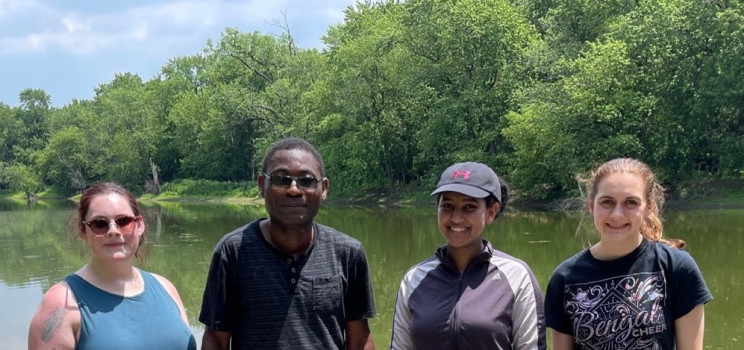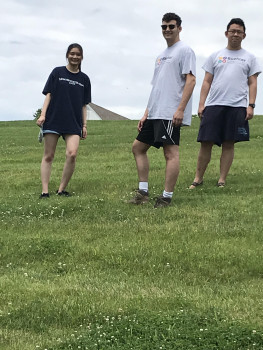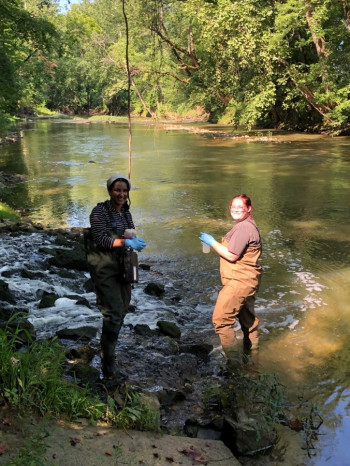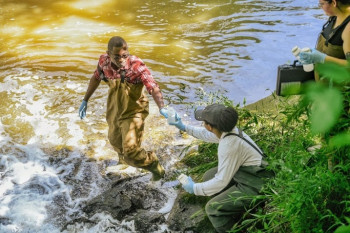Microbial Ecology Squad - Mahaila Martin, Dr. Philips Akinwole, Amerti Guta & Maddy Draper

White Clover Squad - Shiba Seika, Victor Alfonso & Tan Yanjie

Bio Sketch – Dr. Philips Akinwole
Dr. Philips Akinwole earned a MSc in Environmental Science from IHE-Institute for Water Education, Delft in the Netherlands and spent several snowy days scouting streams in German Black forest for his thesis. He earned a doctorate in Biology (Microbial Ecology) from University of Alabama, Tuscaloosa, where his research examined microorganisms involved in dissolved organic carbon utilization, and studied White Clay Creek watershed in Pennsylvanian Piedmont, and the Neversink River watershed in Catskill Mountains in New York. He joined DePauw in Fall 2018 as a postdoctoral scholar and teaches Microbiology (BIO 250), Molecules, Genes and Cells (BIO 101), and Discovery Process in Science & Math (UNIV 150). His use of Ecoplates to study microbial metabolism incorporating Course-based undergraduate research experiences (CUREs) in microbiology class is popular among his students.
Akinwole is a microbial ecologist. He asks questions on how spatial-temporal variations in environmental gradients drive ecological patterns and processes in urban populations and aquatic organisms, with the emphasis on how anthropogenic impacts influence the species distribution, and functional or phylogenetic biodiversity patterns. His recent work (Akinwole et al., 2021) with his undergraduate students at DePauw discuss the impacts of municipal wastewater effluents on spatial and temporal variability of microbial biomass and community structure in the sediments of Big Walnut creek, Greencastle.
Current Research
Current research focuses on behavioral responses and dysbiosis of zebrafish larvae to microplastic exposures at acute and sub-chronic levels. This work will support research efforts in ecotoxicology studies at DePauw University, and expand the engagement of underrepresented groups in STEM.
Other research interest includes:
-
 Quantifying the effect of UV irradiation tertiary treatment of wastewater effluents on soil microbial parameters - a microcosm approach.
Quantifying the effect of UV irradiation tertiary treatment of wastewater effluents on soil microbial parameters - a microcosm approach. -
Impact of chlorinated wastewater effluents on the sedimentary microbial community structure and function of Des Plaines River, Il.
-
Importance of growth kinetic analysis in elucidating bacterial resistance to antibiotics.
-
Cyanogenesis in White Clover. Does Urbanization Drive Adaptive Evolution in White Clover (Trifolium repens)?

Apart from teaching and research, Dr. Akinwole enjoys board games, tennis game, trying new dishes, traveling and visiting new places. Among others, one of his goals is to visit all 50 US states, he has been to 27 states (mostly in the east/south), hoping that COVID-19 pandemic will abate so that he can continue his adventure.
Publications
Philips O. Akinwole, Jinjun Kan, Louis A. Kaplan and Robert H. Findlay. (2021). Spatial variability
in streambed microbial community structure across two watersheds. Microbiology Spectrum
https://journals.asm.org/doi/10.1128/Spectrum.01972-21
Akinwole, P., Guta, A., Draper, M. and Atkinson S. (2021). Spatio-temporal variations in the
physiological profiles of streambed bacterial communities: implication of wastewater treatment
plant effluents. World J Microbiol Biotechnol 37, 136 https://doi.org/10.1007/s11274-021-
03106-2
Akinwole, P., Kaplan, L. and Findlay, R. (2021). Elucidating stream bacteria utilizing terrestrial
dissolved organic matter. World J Microbiol Biotechnol 37, 32 https://doiorg.
duproxy.palni.edu/10.1007/s11274-021-02997-5
Akinwole P.O, E. Lefevre, M.J Powell and R.H Findlay (2014). Unique odd-chain polyenoic
phospholipid fatty acids present in chytrid fungi. Lipids 49: 933-942
Tiegs S.D, P.O. Akinwole and Gessner M.O (2009). Litter decomposition across multiple spatial
scales in stream networks. Oecologia161:343-351
Badejo M.A and Akinwole P.O (2007). Preliminary study of the feeding habits of seven species of
oribatid mites from Nigeria. Systematic & Applied Acarology 12:121-125
Badejo M.A and Akinwole P.O (2006). Microenvironmental preferences of oribatid mite species
on the floor of a tropical rainforest. Experimental and Applied Acarology 40:145-156